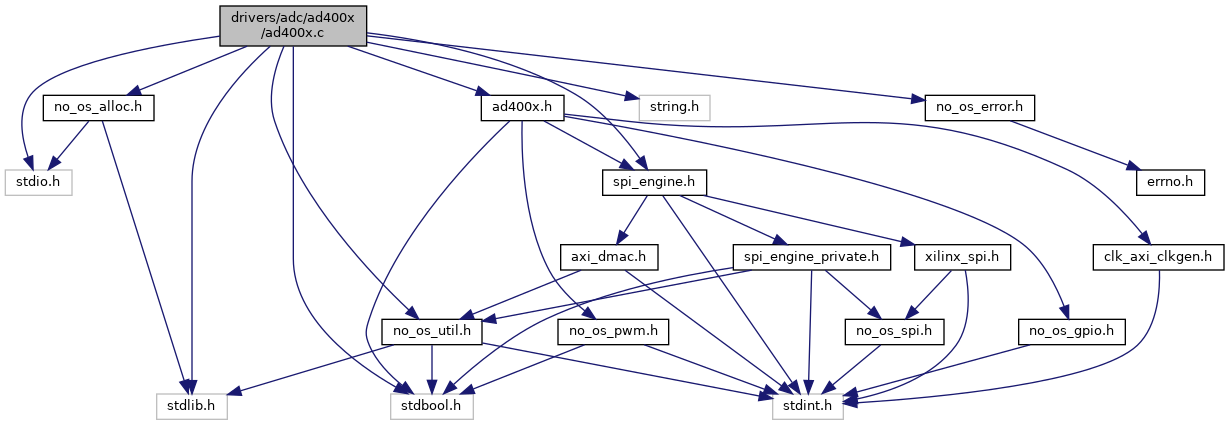Implementation of ad400x Driver. More...
#include "stdio.h"#include "stdlib.h"#include "stdbool.h"#include "string.h"#include "ad400x.h"#include "spi_engine.h"#include "no_os_error.h"#include "no_os_alloc.h"#include "no_os_util.h"
Functions | |
| int32_t | ad400x_spi_reg_read (struct ad400x_dev *dev, uint8_t *reg_data) |
| int32_t | ad400x_spi_reg_write (struct ad400x_dev *dev, uint8_t reg_data) |
| int32_t | ad400x_read_data (struct ad400x_dev *dev, uint32_t *buf, uint16_t samples) |
| int32_t | ad400x_init (struct ad400x_dev **device, struct ad400x_init_param *init_param) |
| int32_t | ad400x_remove (struct ad400x_dev *dev) |
| Free the resources allocated by ad400x_init(). More... | |
Variables | |
| const struct ad400x_dev_info | ad400x_devices [] |
Detailed Description
Implementation of ad400x Driver.
Copyright 2018(c) Analog Devices, Inc.
All rights reserved.
Redistribution and use in source and binary forms, with or without modification, are permitted provided that the following conditions are met:
- Redistributions of source code must retain the above copyright notice, this list of conditions and the following disclaimer.
- Redistributions in binary form must reproduce the above copyright notice, this list of conditions and the following disclaimer in the documentation and/or other materials provided with the distribution.
- Neither the name of Analog Devices, Inc. nor the names of its contributors may be used to endorse or promote products derived from this software without specific prior written permission.
- The use of this software may or may not infringe the patent rights of one or more patent holders. This license does not release you from the requirement that you obtain separate licenses from these patent holders to use this software.
- Use of the software either in source or binary form, must be run on or directly connected to an Analog Devices Inc. component.
THIS SOFTWARE IS PROVIDED BY ANALOG DEVICES "AS IS" AND ANY EXPRESS OR IMPLIED WARRANTIES, INCLUDING, BUT NOT LIMITED TO, NON-INFRINGEMENT, MERCHANTABILITY AND FITNESS FOR A PARTICULAR PURPOSE ARE DISCLAIMED. IN NO EVENT SHALL ANALOG DEVICES BE LIABLE FOR ANY DIRECT, INDIRECT, INCIDENTAL, SPECIAL, EXEMPLARY, OR CONSEQUENTIAL DAMAGES (INCLUDING, BUT NOT LIMITED TO, INTELLECTUAL PROPERTY RIGHTS, PROCUREMENT OF SUBSTITUTE GOODS OR SERVICES; LOSS OF USE, DATA, OR PROFITS; OR BUSINESS INTERRUPTION) HOWEVER CAUSED AND ON ANY THEORY OF LIABILITY, WHETHER IN CONTRACT, STRICT LIABILITY, OR TORT (INCLUDING NEGLIGENCE OR OTHERWISE) ARISING IN ANY WAY OUT OF THE USE OF THIS SOFTWARE, EVEN IF ADVISED OF THE POSSIBILITY OF SUCH DAMAGE.
Function Documentation
◆ ad400x_init()
| int32_t ad400x_init | ( | struct ad400x_dev ** | device, |
| struct ad400x_init_param * | init_param | ||
| ) |
Initialize the device.
- Parameters
-
device - The device structure. init_param - The structure that contains the device initial parameters.
- Returns
- 0 in case of success, negative error code otherwise.

◆ ad400x_read_data()
| int32_t ad400x_read_data | ( | struct ad400x_dev * | dev, |
| uint32_t * | buf, | ||
| uint16_t | samples | ||
| ) |
Read conversion results from device.
- Parameters
-
dev - The device structure. buf - Buffer to hold the conversion results data samples - number of samples to read
- Returns
- 0 in case of success, negative error code otherwise.

◆ ad400x_remove()
| int32_t ad400x_remove | ( | struct ad400x_dev * | dev | ) |
Free the resources allocated by ad400x_init().
- Parameters
-
dev - The device structure.
- Returns
- 0 in case of success, negative error code otherwise.

◆ ad400x_spi_reg_read()
| int32_t ad400x_spi_reg_read | ( | struct ad400x_dev * | dev, |
| uint8_t * | reg_data | ||
| ) |
Read from device.
- Parameters
-
dev - The device structure. reg_data - The register data.
- Returns
- 0 in case of success, negative error code otherwise.

◆ ad400x_spi_reg_write()
| int32_t ad400x_spi_reg_write | ( | struct ad400x_dev * | dev, |
| uint8_t | reg_data | ||
| ) |
Write to device.
- Parameters
-
dev - The device structure. reg_data - The register data.
- Returns
- 0 in case of success, negative error code otherwise.

Variable Documentation
◆ ad400x_devices
| const struct ad400x_dev_info ad400x_devices[] |
 1.8.17
1.8.17